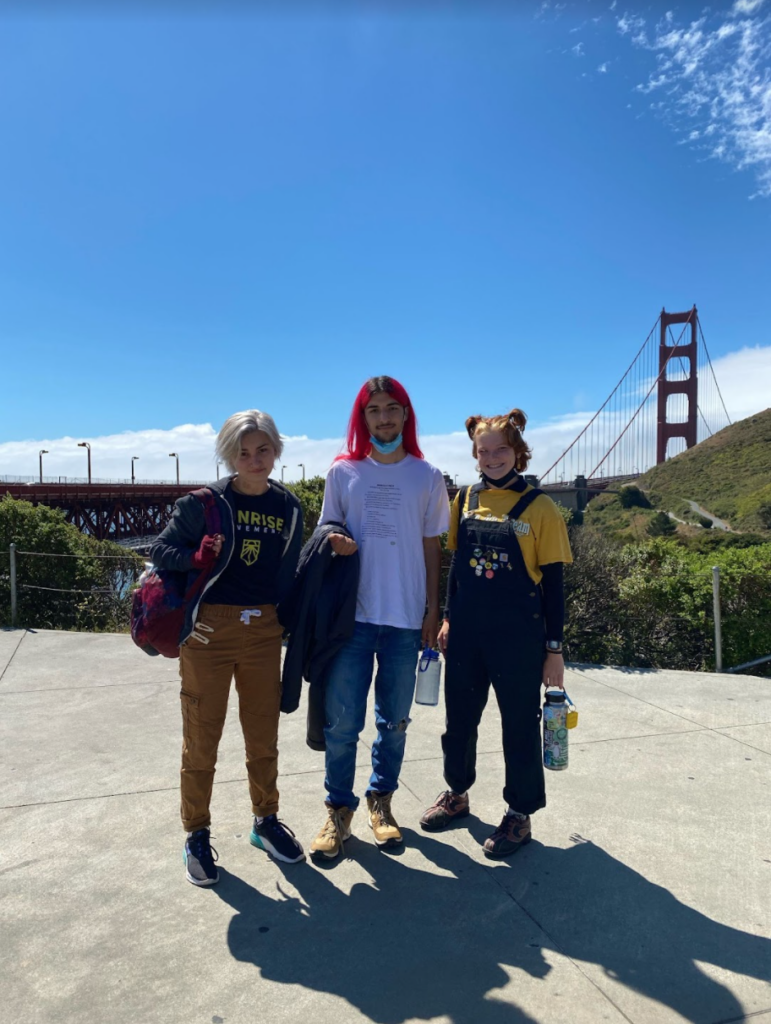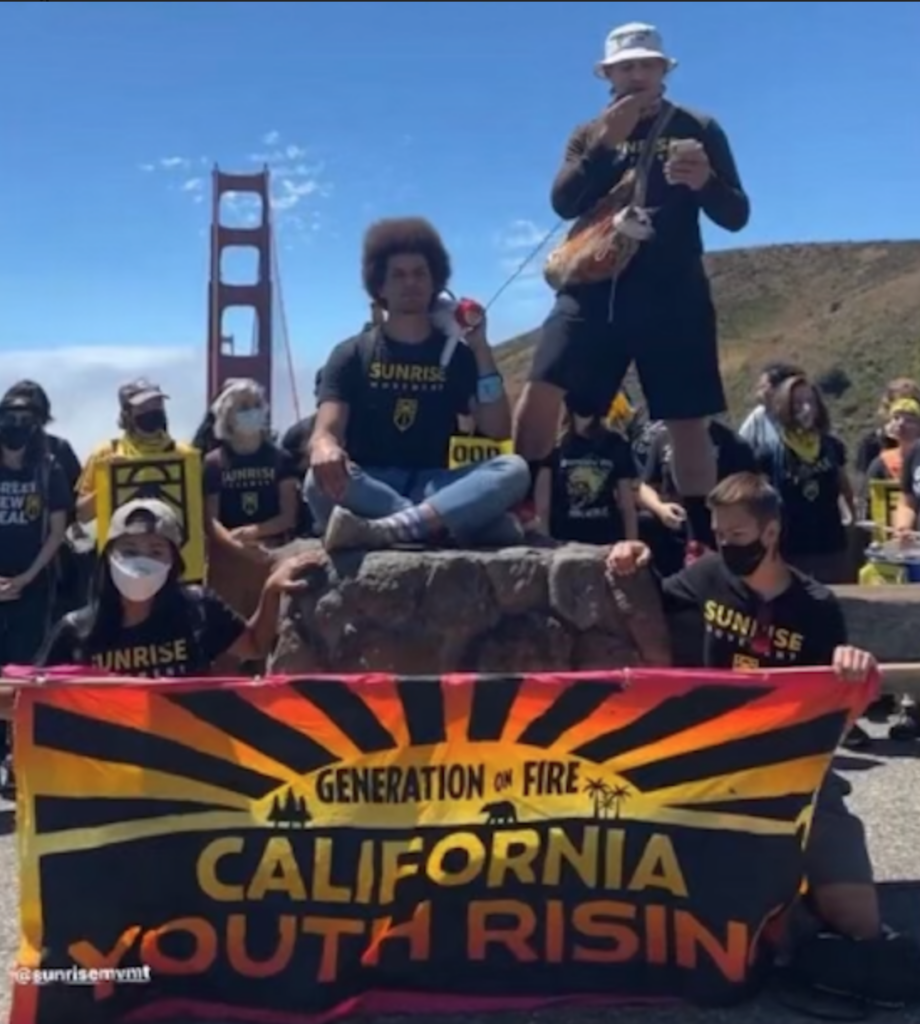ACE INTERVIEW: Talulah Juniper on Youth Voices in Politics
|
April 25, 2022

Talulah Juniper is a 17-year-old Junior at Sonoma Academy in Sonoma County. She started doing climate action work when she was in about 6th grade because it seemed to be the only logical step for her after hearing about the climate crisis and seeing the direct damage it had inflicted around her. At first, she was much more focused on the individual actions she could take to minimize her personal impact on the climate, but as she got more educated on the subject and more involved with the community of climate activists around her, she turned her focus outward, to corporations and politicians. She started going to marches and staging protests and sit-ins but was getting frustrated with the lack of obvious impact it was having. In high school, she joined Schools For Climate Action and has been working with them since. With S4CA, she has written resolutions, done lobbying work, hosted webinars, and helped other youth leaders to inspire change in their communities with resolutions and other activism. She wouldn’t have known that this sort of work was possible for someone her age if it weren’t for her luck in receiving an excellent and thorough climate education, and she wishes for the same opportunities for every other student in the U.S.
Nico Lovejoy (NL): When did you first learn about the climate crisis? What was your immediate reaction?
Talulah Juniper (TJ): I don’t remember the exact moment when I learned about it, because I have been lucky enough to grow up in a community that supports the science of climate change and wants to educate children on it. As soon as I became old enough to really understand what was going on, though, in about 6th grade, my immediate reaction was to do something about it. It was never a question of if I would get involved, but how.
NL: When did you first decide to get involved in climate activism? How and why did you come to that decision?
TJ: I decided to get involved in middle school when the weight of the crisis fully hit me. I learned about it through my friends and community and started to do research to see how I could fit into the solution. It just seemed obvious to me; it was such a big threat and would only continue to worsen as I grew up, so it just seemed logical to start doing the work. At that time, the well-known courses of action were to stop using plastic as much, try to cut down on individual transportation, conserve water, and maybe have a change of diet to cut out red meat. These were all things that I got from the idea of decreasing one’s carbon footprint, which has since been exposed as a method of diverting pressure from corporations and politicians onto the individual. These methods of conservation are still so important, but it took me a while to understand that the more impactful work lies in holding people in power accountable.

NL: What does the word “climate emergency,” mean to you?
For me, “climate emergency” triggers images of all of the natural disasters that I have personally experienced in the past five years or so, specifically the wildfires that have destroyed my home and land. It makes me think of all the marginalized communities whose air quality is poor, who have to work in horrible conditions and face the worst effects of climate change with little support. It reminds me that we don’t have any time to waste and that climate change is an emergency that threatens all of us and our futures.
NL: You’ve participated in lobbying actions before. Why did you decide to get involved with that?
TJ: I joined Schools For Climate Action in my sophomore year of high school, and lobby meetings are a big part of the work we do. I often do multiple lobby meetings a week, in support of bills that our students have written. I love lobbying now and have discovered that it’s a really useful tool that may seem really intimidating at first, if it involves meeting with actual politicians, but is actually very empowering and inspiring.
NL: Have you had success with lobbying the government?
TJ: Although I’ve had my fair share of meetings where I come away from it feeling demotivated and frustrated, I have actually had a lot of success with lobbying. My best example of this is with the climate emergency bill SCR-53. My classmate Izzy and I wrote this bill ourselves and then had to bring it to politicians’ attention to build support and momentum with it. We had to hold many lobby meetings with Senator McGuire and others to gain support for our bill, and early this year, it passed through the California Senate. This wouldn’t have been possible if we hadn’t lobbied so many of our representatives, senators, and assembly members. We have also had success recently with HR-29, which focuses on climate education. My fellow classmates and activists wrote this bill a few years ago, and we have been lobbying intensely to gather sponsors for it. We now have over 50 sponsors, all of which were gained by our lobbying emails and meetings.
It reminds me that we don’t have any time to waste and that climate change is an emergency that threatens all of us and our futures.
NL: Do you feel like politicians take young people seriously enough?
TJ: No. I think some politicians do and have been a tremendous help in furthering our political missions, but in general, youth voices are talked over in politics. Many politicians and organizations seem to want to use young people in their campaigns so that they appear supportive and progressive to the public eye, but then fail to actually support any of their work. I have worked with organizations and politicians who have taken my work and failed to give me credit, because they know they can get away with it, or who have offered a symbiotic partnership but only want to get free work from me and my peers and don’t want to offer support. We have important things to say and important work to share, and we don’t deserve to be talked over just because we’re young.
NL: Why should politicians listen to young people, particularly about taking climate action?
TJ: This point has been reiterated many times before, but it is young people who are going to have to inherit the world, in whatever shape it’s in, once the older generations are gone. Most politicians right now will not be alive to see 2050, which is the year that marks the deadline for keeping our emissions and warming down. They will not have to deal with entire countries becoming uninhabitable and with all the horrific effects of climate change becoming exponentially worse. We will, though. We, the youngest generations, will have to face that as our future if we don’t take action. Ignoring youth voices in this issue would be to ignore the voices of those who will have to face the consequences of our current behavior. We have so much stake in this, and we have so much to offer to the solution, so politicians are remiss to ignore us.

NL: Why do you think it’s important for young people to get involved in politics?
TJ: We will be the next generation of politicians, so we might as well get involved as early as we can. We are working with a running clock, so anything we can do as early as we can is helping. I’m sick of seeing only 70-year-old white men controlling our futures, and young people have so much power to create an incredible impact in politics, so we should use it!
NL: When was a time you felt proud of the impact you had made through your climate activism?
TJ: Writing and passing my own bill through the California Senate has been such an empowering experience. I’m incredibly proud of the work that my classmate and I did to make this happen, and I’m so excited to see how far it could go. The CA Senate is now on record as having declared a climate emergency, which is huge! This sets the groundwork for so many other big steps towards achieving climate justice, and the fact that we did it by ourselves means so much to us as youth activists.
NL: What is your advice to young people who want to get involved in politics, particularly surrounding the issue of climate action?
TJ: Connect to other youth activists! Having a group of like-minded peers has been so important in inspiring me and grounding me. I would also just like to remind young people that this work can be demotivating and daunting sometimes but that it’s so worth it and every little piece of work that we do is important. It’s also important to value self-care and rest in this work to avoid burnout and to take care of mental and physical health.
Photos courtesy of Talulah Juniper.
Answers may have been edited for length.
Want to read more? Check out the ACE Blog!
Join our Youth Action Network
More Blog Posts
Driving India towards self sufficiency and freedom from oil
India can shield itself from oil-price shocks and global pressure over Russian barrels by leaning harder into two strengths it …
Read More
Unnatural, Not Unprecedented
For two weeks, residents of Southern California endured a waking nightmare. Parents raced against time – hurrying down the driveway …
Read MoreCrafting a Vision for the Future: My Experience at LCOY USA 2024
Dry and sunny Tempe, Arizona where temperatures have been over 100 F for 113 consecutive days, delegates gathered to attend …
Read More